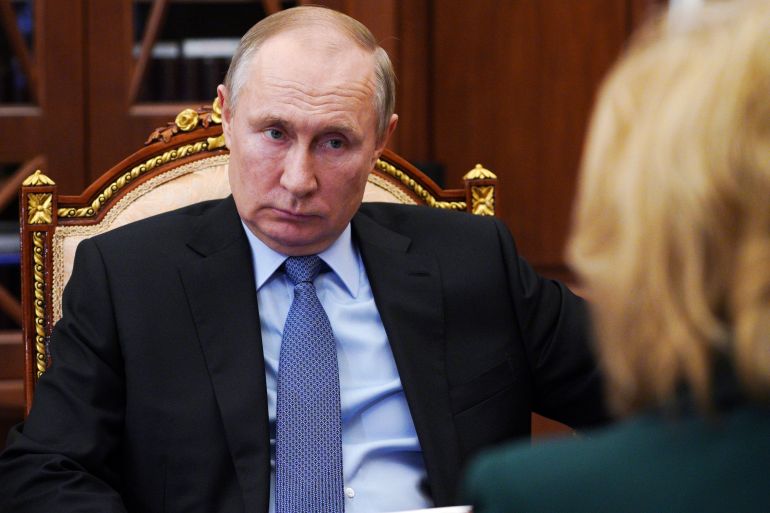Putin signs law allowing him two more terms as Russia’s leader
The legislation allows the 68-year-old Russian president the possibility to stay in power until 2036.

Russian President Vladimir Putin has given final approval to legislation allowing him to hold office for two additional six-year terms, opening the possibility for him to stay in power until 2036.
The 68-year-old Russian leader, who has already been in power for more than two decades, signed off on the bill on Monday, according to a copy posted on the government’s legal information portal.
Keep reading
list of 4 itemsBiden offers Ukraine’s Zelenskyy support amid Russia tensions
Russian court fines Twitter for failing to delete banned content
Biden: Putin is a ‘killer’, Russia to ‘pay’ for election meddling
Putin proposed the change last year as part of constitutional reforms that Russians overwhelmingly backed in a vote in July.
The Russian president, who has been in power for longer than any other Kremlin leader since Soviet dictator Josef Stalin – said he would decide later whether to run again in 2024 when his current six-year term ends.
He has argued that resetting the term count was necessary to keep his lieutenants focused on their work instead of “darting their eyes in search for possible successors”.
The constitutional amendments also emphasised the primacy of Russian law over international norms and outlawed same-sex marriages.
Nearly 78 percent of voters approved the constitutional amendments during the balloting that lasted for a week and concluded on July 1. Turnout was 68 percent.
Following the vote, Russian lawmakers have methodically modified the national legislation, approving the relevant laws.
Putin was first elected president in 2000 and served two consecutive four-year terms. His ally Dmitry Medvedev took his place in 2008, which critics saw as a way around Russia’s limit of two consecutive terms for presidents.
While in office, Medvedev signed off on legislation extending terms to six years starting with the next president. Putin then returned to the Kremlin in 2012 and won re-election in 2018.
‘President for life’
Kremlin opponents have said the constitutional reforms were a pretext to allow Putin to become “president for life”.
“They really think that if they managed to deceive human laws, then they will be able to deceive the laws of nature,” opposition politician Yevgeny Roizman wrote on Twitter.
The opposition has criticised the July constitutional vote, arguing that it was tarnished by widespread reports of pressure on voters and other irregularities, as well as a lack of transparency and hurdles hindering independent monitoring.
In the months since the vote, Russia has also imprisoned the country’s most prominent opposition figure, Alexey Navalny.
Navalny, 44, was arrested in January upon his return from Germany, where he spent five months recovering from a nerve-agent poisoning that he blames on the Kremlin. Russian authorities have rejected the accusation.
In February, Navalny was sentenced to two and a half years in prison for violating the terms of his probation while convalescing in Germany.